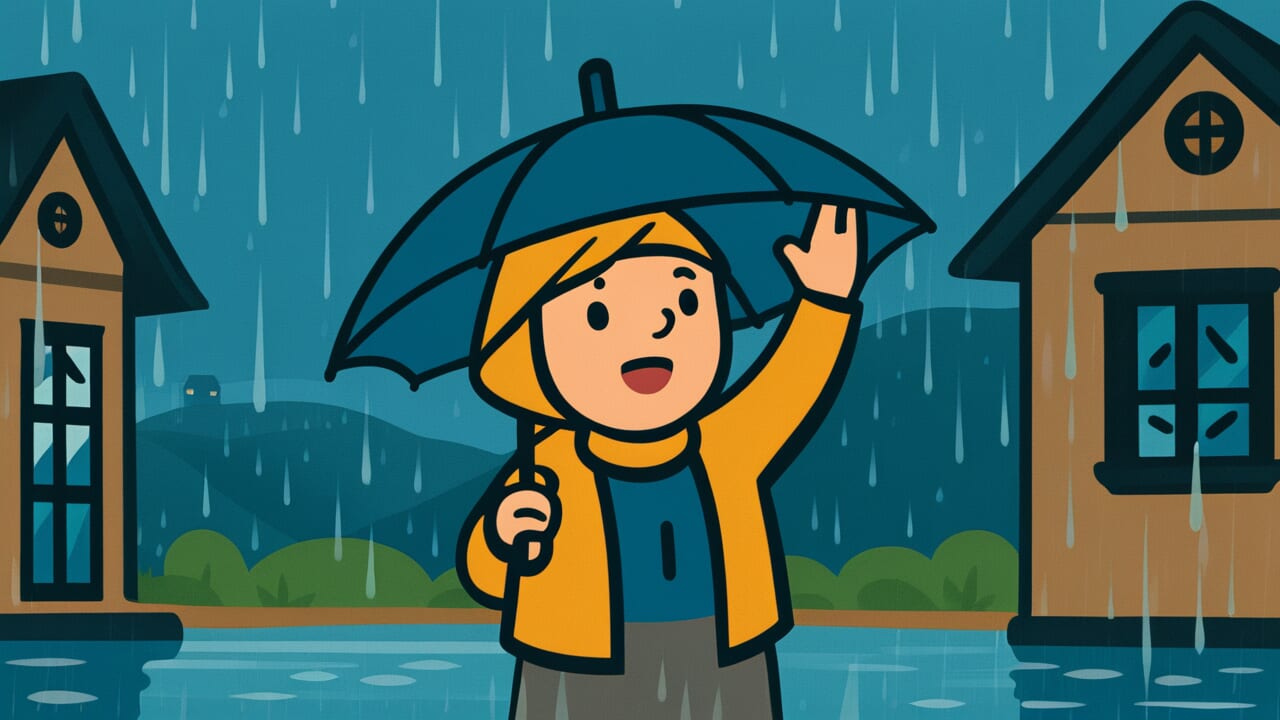How to Read “Taking shelter from a passing shower”
Ichimurasame no amayadori
Meaning of “Taking shelter from a passing shower”
This proverb means that even a chance meeting with a stranger while taking shelter from a sudden rain shower is actually the result of a deep karmic connection.
What seems like a completely random encounter with no connection is actually guided by destined fate. People use this saying when they experience an unexpected meeting or chance reunion to express the mystery and preciousness of that connection.
The reason for using this expression is to convey the Japanese view that human encounters have inevitability. Even the smallest connection has meaning.
Even today, when a casual acquaintance later becomes important, or when reflecting on the value of seemingly insignificant meetings, the deep meaning of these words becomes clear.
This proverb teaches us to cherish human relationships and be grateful for encounters.
Origin and Etymology
There are no clear written records of this proverb’s origin. However, we can make interesting observations from the words themselves.
“Ichimurasame” means a single passing shower or brief rain. The word “murasame” has appeared in classical poetry since ancient times. It describes intense rain that falls suddenly and stops quickly. This sudden rain forced people into unexpected actions.
Before the Edo period, travelers and merchants on Japanese roads encountered sudden rain constantly. When this happened, they took shelter under eaves, beneath trees, or in small temples. Strangers gathered in these same spots to escape the rain.
Japanese culture, influenced by Buddhist thought, tends to find deep meaning in chance encounters. The saying “袖振り合うも他生の縁” (even brushing sleeves is a connection from a past life) represents this view. Any small encounter happens because of karmic ties from previous lives.
“Taking shelter from a passing shower” likely emerged from this philosophical background. Even the coincidence of sheltering from rain in the same place happens because of deep connections. This reflects the Japanese insight into human relationships.
Usage Examples
- I ran into an old friend at the station by chance, and it turned out we’d be working on the same project. It’s truly like taking shelter from a passing shower.
- A casual conversation with someone sitting next to me at a café led to my current job. That connection was like taking shelter from a passing shower.
Universal Wisdom
“Taking shelter from a passing shower” contains a universal truth about human fear of loneliness and our thirst for connection.
We are fundamentally social creatures. Even the most independent person cannot live completely alone. That’s why we seek meaning even in chance encounters.
This isn’t mere superstition. It may reflect an instinct to value connections with others that humans developed through evolution to survive.
This proverb has been passed down because everyone experiences the mystery of life’s encounters. Looking back, many turning points in life came from chance meetings.
Yet we cannot dismiss these coincidences as mere probability. We can’t help but sense some greater force, something like fate or destiny.
This feeling comes from humanity’s fundamental desire to find meaning in life. We can live with more hope by believing everything has meaning rather than seeing life as random events.
Our ancestors deeply understood how the human heart works. That’s why they left us such beautiful proverbs.
When AI Hears This
Waiting for a brief shower like murasame to stop is mathematically an “optimal stopping problem.” You must judge which costs less with incomplete information: getting wet or waiting.
What’s interesting is that strategies humans adopted through experience match answers derived from modern probability theory. There’s a famous mathematical model called the secretary problem.
You interview multiple candidates in sequence and must decide on the spot whether to hire them. The answer is “reject about 37 percent, then immediately choose the first candidate who exceeds all previous ones.”
Taking shelter from rain has the same structure. Giving up too soon means insufficient information. Waiting too long means lost opportunity.
People who knew the murasame weather pattern had a prior distribution from experience: “If you wait 5 to 10 minutes, it will likely stop.” This waiting time setting was the optimal solution that minimized expected loss.
Modern ride-sharing apps that display “rain will weaken in 3 minutes” use the same mathematics. Emergency medicine that treats patients after assessing severity does too. Humans performed this sophisticated decision-making daily without calculation.
Lessons for Today
This proverb teaches modern people to cherish casual everyday encounters. Modern society emphasizes efficiency and purpose so much that we tend to dismiss unplanned events and chance meetings.
But what enriches life may be those unscheduled moments.
The person you passed today, the person who rode the elevator with you, the person behind you at the checkout. Each one might become an encounter that changes your life.
That’s why it’s important to stay open-hearted and treat every encounter with care.
Precisely because we can easily connect on social media, real chance encounters have increased in value. Relationships with people you meet by accident, not through algorithms, can create unpredictable chemistry.
This proverb teaches the importance of having room to enjoy life’s coincidences. Don’t try to control everything. Sometimes go with the flow.
Such flexible attitude might attract unexpected good fortune.



Comments